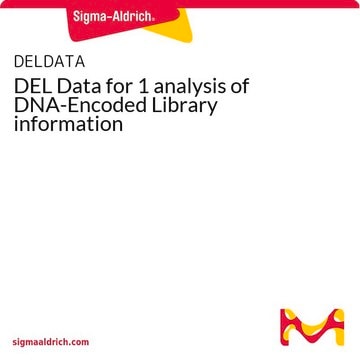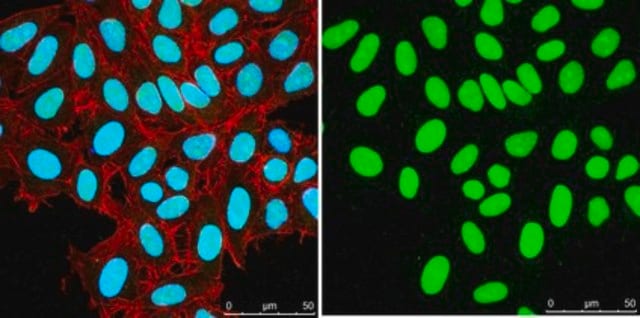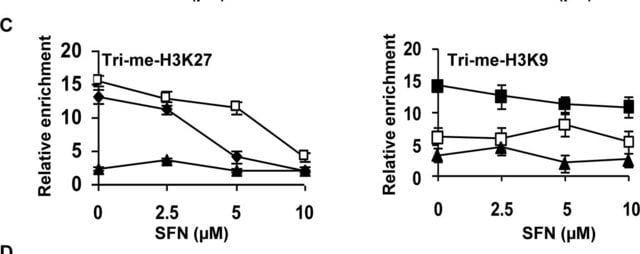General description
Histone H3.3 (UniProt: P84243) is encoded by the H3F3A (also known as H3.3A, H3F3, PP781, H3F3B, H3.3B) gene (Gene ID: 3020) in human. It is a highly conserved variant form of Histone H3, which replaces conventional H3 in a wide range of nucleosomes in active genes. Histone H 3.3 constitutes the predominant form of histone H3 in non-dividing cells and is incorporated into chromatin independently of DNA synthesis. H3.3 is associated with actively expressed genes in both animals and plants. It is predominantly enriched near transcription end sites (TES) of genes and positively associated with transcription. Histone H3 contains a main globular domain and a long N-terminal tail and is involved with the structure of the nucleosomes of the ′beads on a string′ structure. The N-terminal tail of histone H3 protrudes from the globular nucleosome core and can undergo several different types of epigenetic modifications that influence cellular processes. These modifications include the covalent attachment of methyl or acetyl groups to lysine and arginine amino acids and the phosphorylation of serine or threonine. For example, acetylation on Lys10 (H3K9ac; initial methionine removed) impairs methylation at Arg9 (H3R8me2s) and acetylation on Lys19 (H3K18ac) and Lys24 (H3K24ac) favors methylation at Arg18 (H3R17me). Phosphorylation at Ser11 (H3S10ph) by Aurora kinase B is crucial for chromosome condensation and cell-cycle progression during mitosis and meiosis. Phosphorylation at Ser11 by RPS6KA4 and RPS6KA5 is important during interphase because it enables the transcription of genes following external stimulation, like mitogens, stress, growth factors or UV irradiation and result in the activation of genes, such as c-Fos and c-Jun. Mutations in Histone H3.3 have been implicated in a high proportion of malignant pediatric brain cancers. The mutant H3.3 histone disrupts epigenetic post-translational modifications near genes involved in cancer processes and in brain function. Histone H3K27 is reported to be methylated by the Polycomb Repressive Complex 2 (PRC2) for X-chromosome inactivation and gene silencing and H3K27M peptides are shown to be potent inhibitors of PRC2 activity. H3K27I peptide also displays inhibitory, although to a lesser extent, on PRC2. The possibility of K27I mutation in Histone H3 has been suggested in pediatric gliomas, which might be due to blockage of glial cell differentiation. (Ref.: Lewis, PW., and Allis, CD (2013). Cell Cycle. 12(20): 3241-3242).
Specificity
This rabbit polyclonal antibody detects K27I mutant form of histone H3.3 and does not react with the wild-type H3.3.
Immunogen
Epitope: N-terminus
KLH-conjugated linear peptide corresponding to 8 amino acids from the N-terminal region of human histone H3.3 with K27I mutation.
Application
Anti-Histone H3.3 K27I, Cat. No. ABE990, is a highly specific rabbit polyclonal antibody that detects Histone H3.3 mutant K27I and has been tested for use in Western Blotting.
Research Category
Epigenetics & Nuclear Function
Western Blotting Analysis: A 1:1,000 dilution from a representative lot detected Histone H3.3 K27I in HEK293 cells transfected with H3.3 K27I mutant, but not the wild-type. (Courtesy of Dr. Peter Lewis, Rockefeller University).
Quality
Evaluated by Western Blotting in wold-type HEK293 cells and HEK293 cells transfected with Histone H3.3 K27I.
Western Blotting Analysis: A 1:1,000 dilution of this antibody detected Histone H3.3 K27I in HEK293 cells transfected with Histone H3.3 K27I.
Target description
~18 kDa observed; 15.33 kDa calculated. Uncharacterized bands may be observed in some lysate(s).
Physical form
Affinity Purified
Format: Purified
Purified rabbit polyclonal antibody in buffer containing 0.1 M Tris-Glycine (pH 7.4), 150 mM NaCl with 0.05% sodium azide.
Storage and Stability
Stable for 1 year at 2-8°C from date of receipt.
Other Notes
Concentration: Please refer to lot specific datasheet.
Disclaimer
Unless otherwise stated in our catalog or other company documentation accompanying the product(s), our products are intended for research use only and are not to be used for any other purpose, which includes but is not limited to, unauthorized commercial uses, in vitro diagnostic uses, ex vivo or in vivo therapeutic uses or any type of consumption or application to humans or animals.









